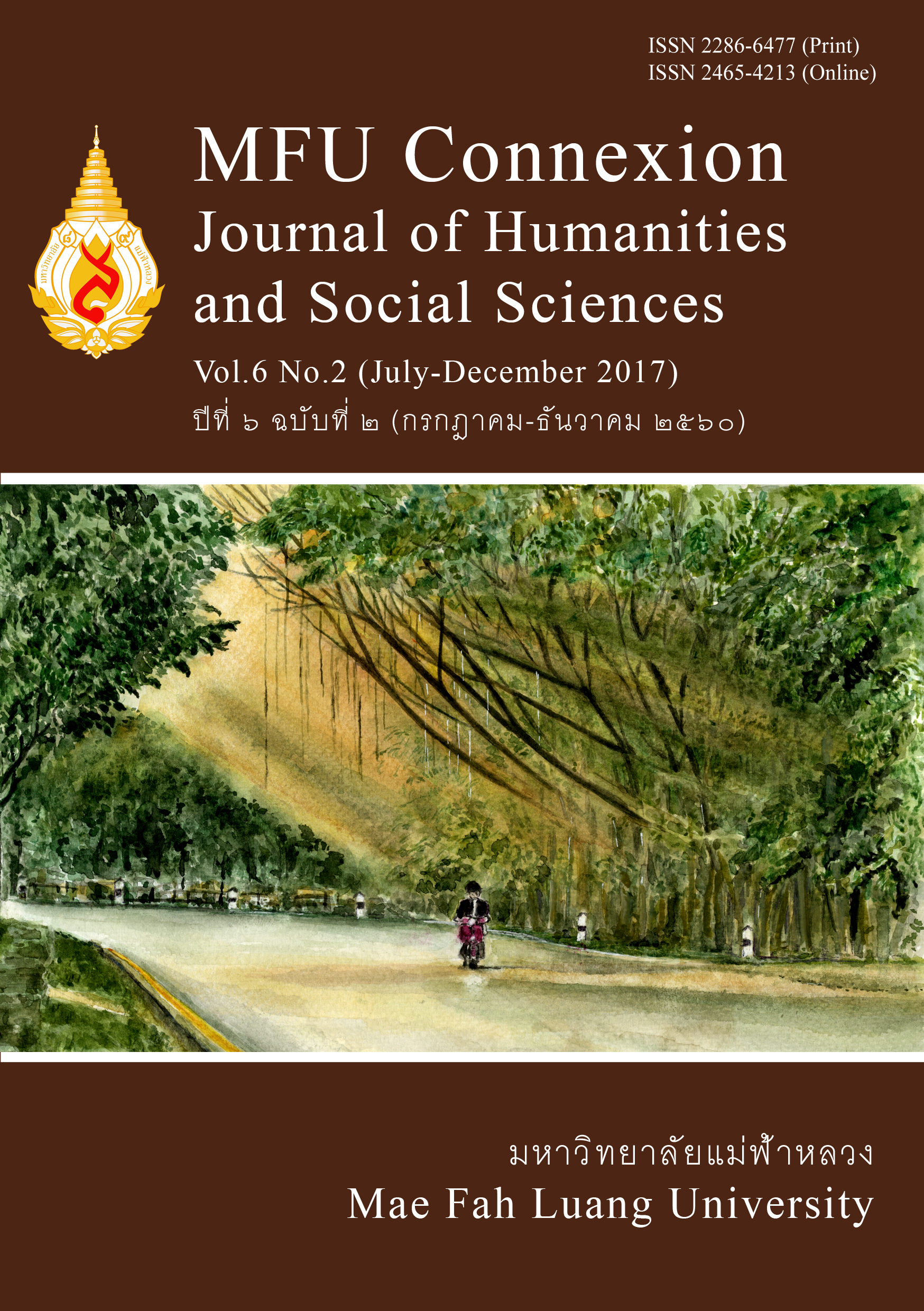Community Potentials and Citizen Participation in Ecotourism Management towards Learning Resources on Community Enterprise of Ban Mea Kam Pong, Chiang Mai (in Thai)
Main Article Content
Abstract
The aim of this research was to study community potentials and citizen participation in ecotourism management towards learning resources on community enterprise of Ban Mea Kam Pong, Chiang Mai. This research was a qualitative research method using participatory community immersion. The data used in the research are classified in two categories (1) Primary data was information from the participatory workshop (2) Secondary data was documentary. The target groups were 2 groups including 9 community enterprise stakeholders and 6 villager representatives. The total target groups was 15 people.
The results of the study revealed that the ecotourism management towards learning resources on community enterprise was the community has the potential to create the learning process and knowledge management in the tourism development of the community enterprise as a learning community that emphasizes citizen participation consisting 4 components: (1) community leader was transformation leaderships (2) learning community (3) collaborative inquiry and (4) action learning. The citizen participation in ecotourism management towards learning resources on community enterprise it was found that the approach leads to a strenuous learning resources were (1) empowerment of villagers (2) learning paradigm shift of villagers (3) lesson-learned of villagers. In addition the study indicated that community social capital was factor supporting to the development of a learning resource on enterprise community consist community cultural heritage, harmoniousness, truth, reliance, and community leaders have a consciousness of “green citizen”, role model of original thought for society, justice, trusty, human relationship, public decision making, and sacrifice for village. Therefore the Ban Mea Kam Pong community has been the outstanding learning resource on community enterprise in Thailand.
Article Details
Copyright
Connexion: Journal of Humanities and Social Sciences has an exclusive right to publish the accepted articles in any form. However, the author retains the following rights:
1. The right to the ownership of the article;
2. The right to use all or part of the article in his/her other works;
3. The right to re-produce the article for personal use or for use in the author’s organisation, in which case the author must obtain permission from Connexion: Journal of Humanities and Social Sciences;
4. The right to make copies of all or part of the work for educational use or for the author’s use in classroom teaching; and
5. The right to include the work (both the preprinted and printed versions) in an institutional repository.
References
Buosonte, R. (2012) Qualitative research in education (วิจัยเชิงคุณภาพทางการศึกษา), Nakhon Sawan: Riming Press, The Department Bluntly Ltd. (in Thai)
Bureekul, T. (2009) Dynamic participation of the Public: From the past to the constitution of Thailand B.E. 2550 (พลวัตการมีส่วนร่วมของประชาชน: จากอดีตจนถึงรัฐธรรมนูญแห่งราชอาณาจักรไทย พุทธศักราช 2550), Bangkok: A.P Graphic Design and Press. (in Thai)
Chandang, V. & Adivadhanasit, C. (2012) The development of the model for a strong community management in line with sufficiency economy in upper central Thailand (การพัฒนารูปแบบการบริหาร จัดการชุมชนเข้มแข็งตามแนวปรัชญาเศรษฐกิจพอเพียง ในเขตจังหวัดภาคกลางตอนบน), Available: https://research.kpru.ac.th/old/Joumal_HSS/images/TGT/2555/pats2/3.pdf [16 December 2017] (in Thai)
Chantavanich, S. (2007) Qualitative research methods (วิธีการวิจัยเชิงคุณภาพ), Bangkok: Chulalongkorn University Press. (in Thai)
Christiaan, G. & Thierry van, B. (2001) Understanding and measuring social capital: A synthesis of finding and recommendations form the social capital initiative, Washington, DC: The World Bank.
Community Enterprise Act. (2005) Royal Thai Government Gazette (ราชกิจจานุเบกษา), vol. 122 Part 6(a). p. 1. (in Thai)
Designated Areas for Sustainable Tourism Administration (Public Organization). (2012) “Ban Mea Kampong” heaven on earth at Chiang Mai (สวรรค์บนดินที่ “บ้านแม่กำปอง” จ.เชียงใหม่), Available: https://www.dasta.or.th/th/ [28 December 2017] (in Thai)
Duangkaewruan, N., et al. (2016) Knowledge management for ensuring land security and reducing environment-destroying behavior of people in community: A case study in Mae Tha sub-district, Mae On district, Chiang Mai province (การจัดการความรู้ของชุมชนเพื่อสร้างความมั่นคงในที่ดินและลดพฤติกรรมทำลายสิ่งแวดล้อมของคนในชุมชน: กรณีศึกษาตำบลแม่ทา อำเภอแม่ออน จังหวัดเชียงใหม่), MFU Connecxion: Journal of Humanities and Social Sciences, vol. 5, no. 2, pp. 45-70. (in Thai)
Grootaert, C. & van Bastelaer, T. (2001) Understanding and measuring social capital: A synthesis of findings and recommendations from the social capital initiative, Washington, DC: The World Bank.
Mangkhang, C., et al. (2016) A study project of the royal project’s knowledge transfer and capacity building for highland communities (รายงานผลโครงการการถ่ายทอดความรู้โครงการหลวงและพัฒนาศักยภาพชุมชนบนพื้นที่สูง), Chiang Mai: Highland Research and Development Institute (Public Organization). (in Thai)
Office of the Royal Society. (2015) Dictionary of contemporary education, The Royal Society (พจนานุกรมศัพท์ศึกษาศาสตร์ร่วมสมัย ฉบับราชบัณฑิตยสภา), Bangkok: Partnership Jiahua Press. (in Thai)
Panyanuwat, A., et al. (2014) Assessing the cost of administering the designated areas for sustainable tourism (รายงานผลการประเมินความคุ้มค่าในการบริหารการพัฒนาพื้นที่พิเศษเพื่อการท่องเที่ยวอย่างยั่งยืน), Bangkok: Designated Areas for Sustainable Tourism Administration (Public Organization). (in Thai)
Pothisita, C. (2007) Art and science of qualitative research (ศาสตร์และศิลป์แห่งการวิจัยเชิงคุณภาพ), Bangkok: Amarin Printing Press. (in Thai)
Potisook, P. (2007) The group discussion at full capacity for researchers in schools and communities (แนวทางการใช้สนทนากลุ่มอย่างเต็มศักยภาพสำหรับการวิจัยในสถานศึกษาและชุมชน), Available: https://research.kpru.ac.th/old/Joumal_HSS/images/TGT/2551/pats2/2.pdf [12 December 2017] (in Thai)
Uwanno, B. & Bureekul, T. (2005) Participatory democracy (ประชาธิปไตยแบบมีส่วนร่วม), Bangkok: King Prajadhipok’s Institute. (in Thai)
Vachanasvasti, K. (2007) The participation of the public policy of the government employment service (การมีส่วนร่วมของประชาชนต่อการดำเนินนโยบายของรัฐบาลด้านการบริการจัดหางาน), Bangkok: Department of Employment, Ministry of Labour. (in Thai)
Wanapaisan, C., et al. (1997) An analysis of the management structure used for conservation tourism of Ban Mea Kampong in Chiang Mai Province (รายงานผลการวิเคราะห์โครงสร้างการจัดการการท่องเที่ยวเชิงอนุรักษ์ของบ้านแม่กำปอง จังหวัดเชียงใหม่), Chiang Mai: Faculty of Education, Chiang Mai University. (in Thai)
Watcharakiettisak, T. (2017) Community economic strengthening by developing community enterprise group at Tambonpolsongkram administration organization, Nonsung district, Nakhornratchasima province (การสร้างความเข้มแข็งทางเศรษฐกิจให้กับชุมชนโดยการพัฒนากลุ่มอาชีพในพื้นที่องค์การบริหารส่วนตำบล พลสงคราม อำเภอโนนสูง จังหวัดนครราชสีมา), Journal of Business Administration, The Association of Private Higher Education Institution of Thailand, vol. 5, no. 1, pp. 43-54. (in Thai)


